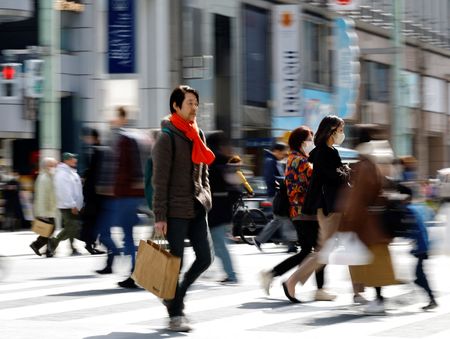By Leika Kihara
TOKYO (Reuters) -Core inflation in Japan’s capital slowed much more than expected in April and fell below the central bank’s 2% target, data showed on Friday, complicating its decision on how soon to raise interest rates.
The reading comes just hours ahead of the conclusion of the Bank of Japan’s two-day policy meeting, where the board is set to keep interest rates steady and produce fresh quarterly inflation projections through early 2027.
The core consumer price index (CPI) in Tokyo, a leading indicator of nationwide figures, increased 1.6% in April from a year earlier, slowing from a 2.4% gain in March. It was much lower than a median market forecast for a 2.2% rise.
Services prices rose 1.6% in April from a year earlier, slowing from 2.7% in March, due largely to the Tokyo metropolitan government’s decision to make some tuition free, the data showed.
A separate index that excludes the effect of both fresh food and fuel costs, closely watched by the BOJ as a broader price trend indicator, also showed inflation slowing to 1.8% in April from 2.9% in March. It was the slowest pace of increase since September 2022, when the index rose 1.7% year-on-year.
While core inflation is still above the central bank’s 2% target, the slowdown highlights uncertainty on whether consumption and wage pressure will strengthen enough to keep price growth durably around that level.
The BOJ has said its decision to end negative rates last month was driven by signs that robust demand and the prospect of higher wages were prodding firms to keep hiking prices for both goods and services.
Governor Kazuo Ueda has said developments in service inflation would be among key factors that could determine the timing of the next rate hike, as they would show whether firms are starting to pass on labour costs to households.
The weak yen complicates the BOJ’s rate hike path. While it helps exports and pushes up inflation, the hit to consumption could cool the economy and discourage firms from passing on the higher costs to households.
(Reporting by Leika Kihara; Editing by Stephen Coates and Sam Holmes)





